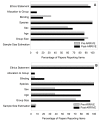Two years later: journals are not yet enforcing the ARRIVE guidelines on reporting standards for pre-clinical animal studies
- PMID: 24409096
- PMCID: PMC3883646
- DOI: 10.1371/journal.pbio.1001756
Two years later: journals are not yet enforcing the ARRIVE guidelines on reporting standards for pre-clinical animal studies
Abstract
There is growing concern that poor experimental design and lack of transparent reporting contribute to the frequent failure of pre-clinical animal studies to translate into treatments for human disease. In 2010, the Animal Research: Reporting of In Vivo Experiments (ARRIVE) guidelines were introduced to help improve reporting standards. They were published in PLOS Biology and endorsed by funding agencies and publishers and their journals, including PLOS, Nature research journals, and other top-tier journals. Yet our analysis of papers published in PLOS and Nature journals indicates that there has been very little improvement in reporting standards since then. This suggests that authors, referees, and editors generally are ignoring guidelines, and the editorial endorsement is yet to be effectively implemented.
Conflict of interest statement
The authors have declared that no competing interests exist.
Figures


References
-
- Cumberland Consensus Working Group (2009) Cheeran B, Cohen L, Dobkin B, Ford G, et al. (2009) The future of restorative neurosciences in stroke: driving the translational research pipeline from basic science to rehabilitation of people after stroke. Neurorehabil Neural Repair 23: 97–107. - PMC - PubMed
-
- Vesterinen HM, Sena ES, Ffrench-Constant C, Williams A, Chandran S, et al. (2010) Improving the translational hit of experimental treatments in multiple sclerosis. Mult Scler 16: 1044–1055. - PubMed
-
- Billiau A, Heremans H, Vandekerckhove F, Dijkmans R, Sobis H, et al. (1988) Enhancement of experimental allergic encephalomyelitis in mice by antibodies against IFN-gamma. J Immunol 140: 1506–1510. - PubMed
-
- Baker D, Butler D, Scallon BJ, O'Neill JK, Turk JL, et al. (1994) Control of established experimental allergic encephalomyelitis by inhibition of tumor necrosis factor (TNF) activity within the central nervous system using monoclonal antibodies and TNF receptor-immunoglobulin fusion proteins. Eur J Immunol 24: 2040–2048. - PubMed
-
- Panitch HS, Hirsch RL, Haley AS, Johnson KP (1987) Exacerbations of multiple sclerosis in patients treated with gamma interferon. Lancet 1: 893–895. - PubMed
MeSH terms
Grants and funding
LinkOut - more resources
Full Text Sources
Other Literature Sources

